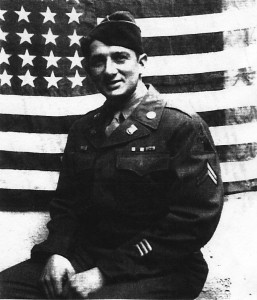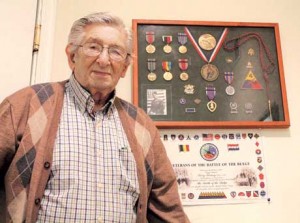An excerpt from the article “From Minsk, to Hollywood, to Buchenwald” by Joanne Palmer, originally appearing in the “Jewish Standard”, reprinted with permission

Harry Feinberg spent a few years playing with the Harmonica Rascals. The group went to Hollywood, where they appeared in movies. That was Old Hollywood, the place of black-and-white glamour and dangerous glittery prewar dreams. Mr. Feinberg lived very well there. “I met Tyrone Power. We worked with Mischa Auer, and Mae West. (“She was blind as a bat,” Mr. Feinberg said. “Her chauffeur was backstage with her to hold her hand and led her whenever she was ready to go on stage. But every time she passed me, she’d say, ‘Hello, Harry.’”) He never went back to [finish] high school. But in 1940, his parents called him home. The war was coming closer, the harmonica wave had crested, and it was time.
Mr. Feinberg’s father and his uncle had become building contractors, and he worked with them. Then he was drafted. That was 1942; Mr. Feinberg was 21. Basic training was in Fort Dix. “It was a cold winter, and we slept in tents,” Mr. Feinberg said. “You had to look at the bulletin board every day to see what your duty was going to be the next day. One night I saw that I was on KP. That’s kitchen police. I thought that I would have to guard the kitchen with a gun at my side, but it was not that at all.
“We went to the mess hall at 5 in the morning. The sergeant said to the other guy, ‘Come with me.’ There was a cubicle, and inside it were piles of potatoes, bags and bags of potatoes. The other guy had to peel potatoes all day long. “I went to the next cubicle, and there were onions, bags and bags of onions. Up to the ceiling. And there was a pot of boiling water. “So from 5 in the morning until about 11 at night, I peeled onions. I couldn’t see from the fumes. I stunk to high heaven. It was unbearable. My eyes were watery red. “From that day until today, I have never eaten another onion.” If all that had changed for him on that day was the acquisition of a lifelong aversion to onions, that would have been enough.
But it wasn’t. “The funny thing is that I got drafted the same day as a trumpet player who played with all the big bands,” he said. “While I was peeling onions, his name and mine kept being blared out all over Fort Dix. Then, at 11 o’clock at night, I came back to my tent, and one of the guys tells me, and says you’d better go see the first sergeant. As I went to him — they were playing cards at night, they were really rough guys — and one of them picks his head up and says ‘Oh yeah, there is some kind of show, and your name was called.’” He was to have been in it, but he missed the call. He was too busy peeling onions. The show was the review “This Is The Army,” written by Irving Berlin. In the movie version, Mr. Berlin sings his own song, “Oh How I Hate To Get Up In The Morning.”
Instead of being a traveling [harmonica] player, Mr. Feinberg fought in Europe. He was in the army from 1943 to 1945 — “three years and ten months,” he said — and “I was one of General George S. Patton’s tankers. “We really spearheaded the European campaign. I was in all five of Patton’s campaigns. We started out in Utah Beach, in France, then Luxembourg, Belgium, the Battle of the Bulge, and on into Czechoslovakia. “I have no idea why I’m alive today.” Mr. Feinberg drove a tank.
“We came face to face with Germany every day,” he said. “I was a gunner. I had a big gun next to me. I would take a big shell, put it in the gun. I had a telescope right next to the gun. I was in the turret, I would see the enemy, and I would shoot. “I saw heads flying, arms flying. When the dust cleared, I would see bodies all over the place. It didn’t look real. Not a thing for a Jewish boy to see. Or actually for anybody to see.” He eventually was made a tank commander. “I took a few hits,” he said. “I lost two tanks. It was no joke. I don’t know how we got out alive. The second tank just burned to a crisp. “When we were hit, I yelled, ‘Let’s get out of here.’ The gunner was such a polite guy that he said, ‘Go out. I’ll go after you.’ I had to pick him up and throw him out, and then I jumped out and ran. I don’t know how many yards. And then I looked back and saw billows of smoke.
“It drove me a little nuts. The medics saw me and tackled me, and put me in an ambulance, took me to a field hospital. I was there three days, under a doctor’s care. They gave me big blue pills to calm me down. “The doctor had a card table, and we would line up. He smoked a cigar. He said, ‘Follow my fingers. How many fingers do you see?’ I told him and he said, ‘You’re ready to go back to the front.’ I said, ‘Please don’t send me back,’ but he said, ‘Sorry. I have to.’ “I went back. “They got me a third tank, and my company commander said, ‘Harry, we got a new buggy for you.’ I said, ‘I can’t get into a tank again. It’s impossible. My head doesn’t allow it.’ And he said, ‘You’re right. You’re not getting into another tank. Do you realize that they cost $30,000 each?’ So he put me in a jeep, and made me a corporal.
“I would have to go from company to company with a secret message.” It would be on a small scroll of paper that he would hide in a slit cut into his uniform, right next to the zipper. “That was my job until the end of the war,” he said. “It was scary. Everything happened at night, and here I was, driving by myself at night. “One night, my first sergeant and I got to a town in Germany, and we smelled something wrong. “He looked at his map, and said that this is a town called Jenna — and I don’t think this town has been taken. We were the first Americans there. “We said that we’d better get the hell out of there. “As we turned around, we saw two Germans standing there in uniform, a major and his aide. My sergeant says ‘Stop,’ and he runs out and points his gun at them. They both come out with their hands up. He took their guns, and asked me which one I wanted. “I still have it.”
Mr. Feinberg spoke Yiddish, so he interrogated some of the Germans the army captured. “They were happy to give up,” he said. “I mentioned Patton, and they’d stand up. The name would freeze the blood in their veins. “We were not there to liberate anyone,” he continued. “Just to find and destroy. That’s what our outfit did. We were a combat outfit. We would get up, eat breakfast, and shoot.” After attacks, General Patton would come by, drive in his jeep with the four stars, and call us all over to say, ‘Good job, boys. Mr. Feinberg stood close to him at one of these sessions. “I was interested not in looking at him or listening to him, but in looking at the two ivory-handled guns on his belt,” he said. “He was big. Tall. His eyes were always bloodshot. I think he drank a lot of booze. “And he shortened the war for us.”
Although his job was not to liberate, his unit — the Fourth Armored Division — liberated a concentration camp, and then got to Buchenwald six days after its liberation. Mr. Feinberg and his unit entered Ohrdruf, a concentration camp near Weimar, Germany, on April 4, 1945. “We were driving into Germany; we got into Gotha without firing a shot,” he said. “We took over the town. There were no cars, no people, no activity. Of course, everyone was hiding from us. We kept going until we came to the town of Ohrdruf. We had no idea about labor or concentration camps. “We went up into the woods. There were signs on the trees saying ‘Verboten.’” Forbidden. “We came up to the edge of the woods, and we saw fences, and a gate, with only two men there. One was 65 years old and one was 70. They were in German uniforms, with helmets and rifles. As soon as they saw us, they threw them down.
“We saw the ugliest thing that anyone had ever seen, toothpicks walking around. There were bodies in the courtyard, with striped uniforms. We thought that everyone in the pile was dead, but there were barracks. I got off my tank and looked around, with my handkerchief over my mouth. I spooked a man lying on his back, with his head shaved, in a striped uniform, gasping for air. I knelt down, and he sensed that somebody was there. He looks up, and he didn’t have the strength for it but he said, ‘Amerikaner?’ and I said “Jah. Amerikaner.’ He didn’t have the strength, but he put his hands together, thanking me for freeing him.” Mr. Feinberg got a doctor and an ambulance for the man, but he does not know the end of that story. General Dwight D. Eisenhower was there, and so was General Patton. “As tough a guy as Patton was, I saw him go back behind one of the barracks upchucking,” Mr. Feinberg said.
As for Buchenwald, amid all the horrors he saw — the people were gone by then, as were their murderers, but their tools remained — what haunts him most, “what drove me crazy, was a wooden crate with babies’ shoes,” he said. After the war, as part of the Army of Occupation, Mr. Feinberg helped police towns in Germany. “We were on guard night and day to make sure that there was no uprising,” he said. “They gave me a territory of 13 little towns. They were very quaint. Very cute. It was my job to find the mayor of each town. I would go into the town — the road would be lined with cattle. At 4:30 or so, the kids in town would have the job of bringing the cows back home. The cows knew which house to go to, and the kids would make sure that they didn’t stray, but only went to the house they belonged to. I would interrogate the mayor. I was a tough guy, a tough sergeant. No smiles. I told them that I had to know what was going on. I had to know about all meetings. If they had any guns or ammunition or explosives or hand grenades, they had to bring them to their yards, and we would destroy them.
“The Americans would get up at 2 in the morning and raid their houses. It was cruel, but it had to be done. “The mayor knew I was Jewish. They all knew, and they were frightened of me. “One day, I saw a girl who said she spoke English; she said she came from Montclair. I asked, ‘What are you doing here?’ and she said ‘My family was in Germany.’ I said, ‘You mean that your father thought that Hitler was going to take over America, so you’d be safer here.’ She put her head down and wouldn’t answer me. But she was a big help to me.”
Once he came home, Mr. Feinberg took advantage of the GI Bill to go to a school in Paterson that taught building trades, and he got married; he and his wife, Edie, have been married for more than 50 years, and they are proud parents of three children and grandparents of three grandchildren. Mr. Feinberg worked as a contractor until the injuries he’d gotten during the war caught up with him. He is now in a wheelchair. Mr. Feinberg, past president of the national Fourth Armored Division Association, secretary/treasurer of the New York chapter of that association, and past president of the Garden State Harmonica Club, has two Purple Hearts. Last month [November 2013], the French government named him a Chevalier of the Legion of Honor, its highest honor.

